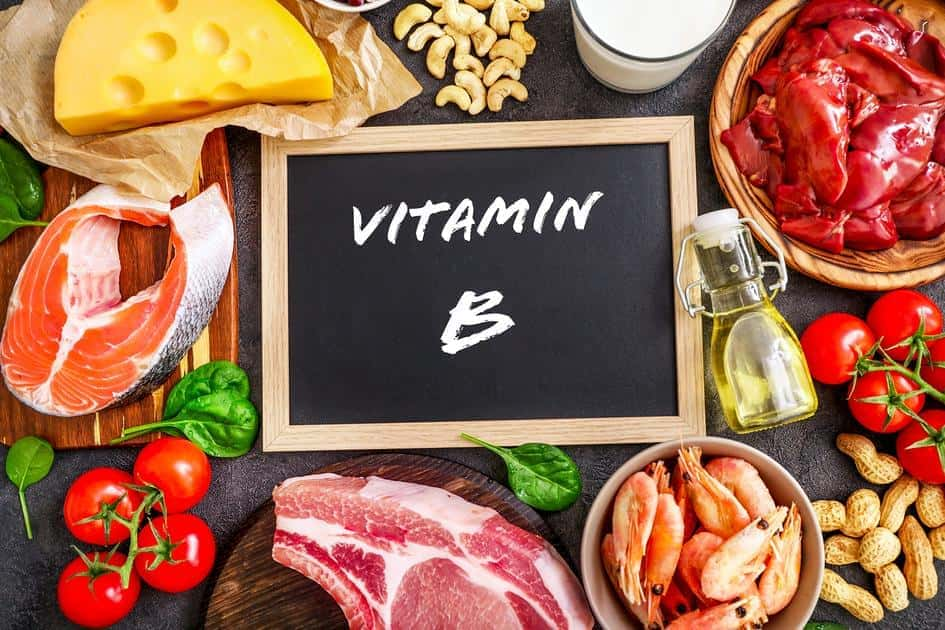B-Complex Vitamins, a group of nutrients that play many important roles in your body.
B-Complex Vitamins, a group of nutrients that play many important roles in your body.
Nutritional supplements that contain all eight B vitamins are referred to as B-complex vitamins. B-complex supplements usually pack all eight B vitamins into one pill. B vitamins are water-soluble, means your body does not store them, for this reason that your diet must supply them each day.
Most people get the recommended amounts of these vitamins through diet alone since they are found in a wide variety of foods. However, factors like age, pregnancy, dietary choices, medical conditions, genetics, medication and alcohol use increase the body’s demand for B vitamins. In these circumstances, supplementing with B vitamins may be necessary. B vitamins have many important functions and are vital for maintaining good health. B-complex vitamins usually contain the following:
B1 (thiamine): Thiamin or thiamine, also known as vitamin B1, is a water-soluble vitamin found naturally in some foods. Thiamin plays an important role in the growth and function of various cells. Thiamin is only stored in the liver in small amounts, so a daily intake of thiamin-rich foods is needed. The richest food sources include pork, sunflower seeds, and wheat germ.
B2 (riboflavin): Riboflavin also known as vitamin B2 is present in many foods. Riboflavin is a key component of coenzymes involved with the growth of cells, energy production, and the breakdown of fats, steroids, and medications. Bacteria in the gut can produce small amounts of riboflavin, but not enough to meet dietary needs. Most riboflavin is used immediately and not stored in the body, so excess amounts are excreted in the urine. An excess of dietary riboflavin, usually from supplements, can cause urine to become bright yellow. Foods containing the most riboflavin include organ meats, beef, and mushrooms.
B3 (niacin): Niacin, also known as vitamin B3, is a water-soluble B vitamin found naturally in some foods. Niacin helps to convert nutrients into energy, create cholesterol and fats, create and repair DNA, and exert antioxidant effects. The two most common forms of niacin in food and supplements are nicotinic acid and nicotinamide. The body can also convert tryptophan - an amino acid - into nicotinamide. Niacin is water-soluble so that excess amounts the body does not need are excreted in the urine. Niacin works in the body as a coenzyme, with more than 400 enzymes dependent on it for various reactions. Food sources include chicken, tuna and lentils.
B5 (pantothenic acid): Pantothenic acid or vitamin B5, is naturally present in foods. It is used to make coenzyme A (CoA), a chemical compound that helps enzymes to build and break down fatty acids as well as perform other metabolic functions, and acyl carrier protein, which is also involved in building fats. Bacteria in the gut can also produce some pantothenic acid but not enough to meet dietary needs. Liver, fish, yogurt and avocados are all good sources of pantothenic acid.
B6 (pyridoxine): Pyridoxine, also known as vitamin B6, is a water-soluble vitamin found naturally in many foods. Pyridoxal 5’ phosphate (PLP) is the active coenzyme form and most common measure of B6 blood levels in the body. PLP is a coenzyme that assists more than 100 enzymes to perform various functions, including the breakdown of proteins, carbohydrates, and fats; maintaining normal levels of homocysteine (since high levels can cause heart problems); and supporting immune function and brain health. Foods rich in this vitamin include chickpeas, salmon and potatoes.
B7 (biotin): Biotin has a popular name as vitamin B7. It is a water-soluble B vitamin found naturally in some foods. Biotin plays a vital role in assisting enzymes to break down fats, carbohydrates, and proteins in food. It also helps to regulate signals sent by cells and the activity of genes. Yeast, eggs, salmon, cheese and liver are some of the best food sources of biotin.
B9 (folate): Folate is the natural form of vitamin B9, water-soluble and naturally found in many foods. Folate helps to form DNA and RNA and is involved in protein metabolism. It plays a key role in breaking down homocysteine, an amino acid that can exert harmful effects in the body if it is present in high amounts. Folate is also needed to produce healthy red blood cells and is critical during periods of rapid growth, such as during pregnancy and fetal development. Folate can be found in foods such as green vegetables, liver and beans. It is also added to foods and sold as a supplement in the form of folic acid, this form is actually better absorbed than that from food sources—85% vs. 50%, respectively.
B12 (cobalamin): Cobalamin also called vitamin B12 is naturally found in animal foods. Cobalamin is needed to form red blood cells and DNA. It is also a key player in the function and development of brain and nerve cells. Cobalamin binds to the protein in the foods we eat. In the stomach, hydrochloric acid and enzymes unbind Cobalamin into its free form. From there, Cobalamin combines with a protein called intrinsic factor so that it can be absorbed further down in the small intestine. Cobalamin is found naturally in animal sources such as meat, eggs, seafood and milk.
Although these vitamins share some characteristics, they all have distinct functions and are needed in varying amounts. B-complex supplements may relieve stress, boost cognitive performance and reduce symptoms of depression and anxiety, even in people without B vitamin deficiencies.

Who Should Take a B-Complex Vitamin?
Since B vitamins are found in many foods, you are most likely not at risk of developing a deficiency as long as you follow a well-rounded diet. However, certain circumstances increase the need for B vitamins, making supplements necessary.
Pregnant or Breastfeeding Women
During pregnancy, the demand for B vitamins, particularly B12 and folate, grows to support fetal development. In women who are pregnant or breastfeeding, especially those who follow vegetarian or vegan diets, supplementing with a B-complex vitamin is crucial. B12 or folate deficiency in pregnant or breastfeeding women can lead to severe neurological damage or birth defects in the fetus or infant.
Older Adults
As you age, your ability to absorb vitamin B12 decreases and your appetite declines, making it difficult for some people to get enough B12 through diet alone. The body’s ability to release B12 from food so that it can be absorbed depends on adequate amounts of stomach acid. However, it’s estimated that 10–30% of people over 50 don’t produce enough stomach acid to properly absorb B12. Deficiency in B12 has been linked to increased rates of depression and mood disturbances in elderly people. Deficiencies in vitamin B6 and folate are also common in the elderly population.
Those With Certain Medical Conditions
People with certain medical conditions, such as celiac disease, cancer, Crohn’s disease, alcoholism, hypothyroidism and anorexia, are more susceptible to developing nutrient deficiencies, including B vitamins. Additionally, the MTHFR genetic mutation can affect how your body metabolizes folate and can lead to a folate deficiency and other health issues. What’s more, people who have undergone certain weight-loss surgeries are also more likely to be deficient in B vitamins. In these circumstances, patients are often advised to supplement with a B-complex vitamin to correct or avoid deficiencies.
Vegetarians and Vegans
Vitamin B12 is naturally found in animal products like meat, dairy, eggs and seafood. Vegans and strict vegetarians could be at risk of developing a B12 deficiency if they don’t get enough of this vitamin through fortified foods or supplements. A daily B-complex vitamin can help ensure that people who choose to follow diets that eliminate animal products are getting enough of these important nutrients.

People Taking Certain Medications
Commonly prescribed medications can lead to a deficiency in B vitamins. For example, proton pump inhibitors, which are medications that lower stomach acid, can decrease the absorption of B12, while metformin, a popular diabetes drug, can decrease levels of both B12 and folate. Birth control pills can also deplete several B vitamins, including B6, B12, folate and riboflavin.
Health Benefits of Taking B-Complex Vitamins
While certain conditions make it necessary for some people to supplement with B-complex vitamins, research has shown that taking a B-complex supplement may be helpful even for people who don’t have an increased need for these nutrients.
Reduce Stress and Boost Mood
B-complex vitamins are often used to reduce fatigue and boost mood. Some studies suggest that B-complex vitamins can lift your spirits and improve your cognitive performance.
A 33-day study in 215 healthy men found that treatment with a high-dose B-complex and mineral supplement improved general mental health and stress and enhanced performance on cognitive tests. Another study in young adults showed that supplementing with a multivitamin containing high levels of B-complex vitamins for 90 days reduced stress and mental fatigue.

Reduce Symptoms of Anxiety or Depression
While B-complex vitamin supplements are not a cure for mental health issues, they may help improve symptoms of depression or anxiety. A study in 60 adults with depression showed that treatment with a B-complex vitamin for 60 days led to significant improvements in depression and anxiety symptoms, compared to a placebo.
B vitamins may also enhance treatment response when given in combination with antidepressant medication. One study found that supplementing patients with a vitamin containing B12, B6 and folic acid led to a more enhanced and sustained antidepressant response over one year, compared to a placebo.
Note that low blood levels of certain B vitamins, including B12, B6 and folate, have been linked to an increased risk of depression, which is why it’s important to rule out nutrient deficiencies if you are experiencing symptoms of depression.
Recommended Dosage
Each B vitamin has a specific recommended daily amount that varies depending on gender, age and other variables like pregnancy. For women and men, the recommended daily intake (RDI) for B vitamins are as follows:
- B1 (Thiamine): Women 1.1 mg, Men 1.2 mg
- B2 (Riboflavin): Women 1.1 mg, Men 1.3 mg
- B3 (Niacin): Women 14 mg, Men 16 mg
- B5 (Pantothenic acid): 5 mg (RDI not established; Adequate Intake, or AI, provided), Men 5 mg (AI)
- B6 (Pyridoxine): Women 1.3 mg, Men 1.3 mg
- B7 (Biotin): Women 30 mcg (AI), Men 30 mcg (AI)
- B9 (Folate): Women 400 mcg, Men 400 mcg
- B12 (Cobalamin): Women 2.4 mcg, Men 2.4 mcg
Pregnant and lactating women need higher amounts of B vitamins, while infants and children need less. If you are deficient in B vitamins, you may need to supplement with higher doses to correct the deficiency. For these reasons, it’s important to choose a B-complex supplement based on your individual requirements for each B vitamin. Speak with your doctor regarding your specific nutrient needs based on your age and health.

Potential Side Effects
Since B vitamins are water-soluble, it’s unlikely that you will consume too much of these nutrients through diet alone or by taking a B-complex supplement as directed. However, taking supplements that contain excessively high and unnecessary quantities of B-complex vitamins could lead to serious side effects.
High doses of supplemental B3 (niacin) may lead to vomiting, high blood sugar levels, skin flushing and even liver damage.
Additionally, high doses of B6 can cause nerve damage, light sensitivity and painful skin lesions.
Another side effect of B-complex supplements is that it can turn urine bright yellow. Although discolored urine can be shocking, it’s not dangerous but simply your body getting rid of excess vitamins that it can’t use.
If you need to take a B-complex supplement, always choose reputable brands that volunteer to have their products independently tested by organizations like the US Pharmacopeial Convention (USP).
Compiled and penned by Crocus Media

